#japanese politics
Text
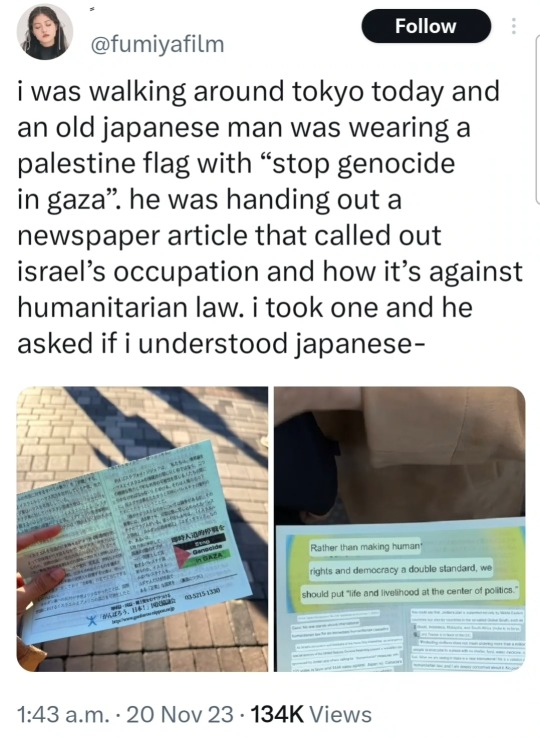
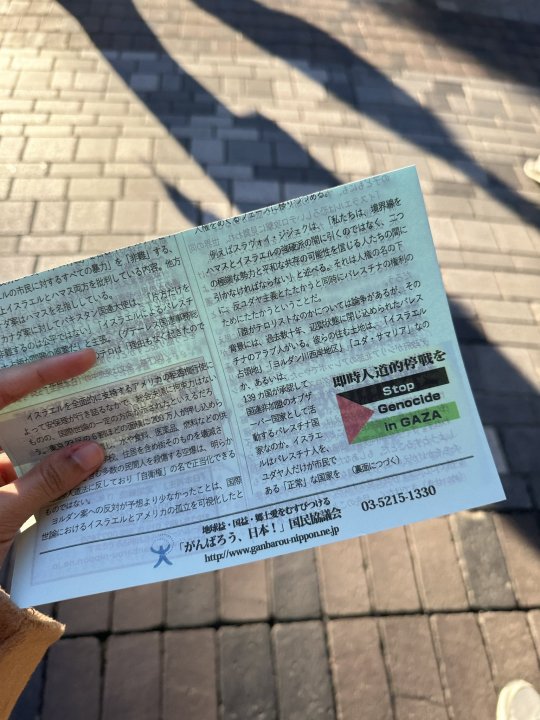

X/Formerly known as Twitter user states: I was walking around Tokyo today and an old Japanese man was wearing a Palestine flag with "stop genocide in Gaza." He was handing out a newspaper article that called out Israel's occupation and how it's against humanitarian law. I took one and he asked if I understood Japanese…" [this person later clarifies in the next post that they do not, but they accepted it and they provided an image of this newspaper article they recieved, which I attached, with a Google translation of the document, which I will add English translations for that were provided by this user on X/Twitter: @ fumiyafilm
Newspaper article piece states (Google rough translation: Japanese to English):
Rather than making human rights and democracy a double standard, we should put "life and livelihood at the centre of politics." Gaza : no one stands above international humanitarian law for an immediate humanitarian ceasefire.
As Israel's occupation and blockade of the Gaza Strip intensifies, an emergency special session of the United Nations General Assembly passed a resolution co-sponsored by Jordan and others calling for "humanitarian" measures with 121 votes in favor and 1444 votes against [I believe the translation captured this incorrectly -I believe they mean 144?)] (Japan is). Canada's amendment did not recieve two-thirds majority required for adoption. The difference between the two resolutions is whether or not they specify resposibility for Hamas's terrorist acts. Jordan's proposal does not name Hamas, calling the increase in violence since the October 7th attack and "act of terrorism."
You could say that, Jordan's plan is supported not only by Middle Eastern countries but also countries in the so-called Global South, such as Brazil, Malaysia, and South Africa (India is in favor and France is in favor of the G7).
Protecting civillains does not mean ordering more than a million people to evacuate to a place with no shelter, food, water, medicine, or fuel. What we are seeing in Gaza is a clear intentional -This is a violation of humanitarian law, and I am deeply concerned about it. No party, no matter what, stands above international humanitarian law. As UN Secretary General Antonio Guterres asserts, international public opinion (cut off on document) "war," "Arab vs. Israel," Pro-Israel is not pro-Barres," but rather a international movement calling for (unsure part of this document here) "stop the humanitarian crisis…"
#feminist#feminism#israel is an apartheid state#palestine#social justice#freepalastine🇵🇸#free gaza#free palestine#israel is committing genocide#israel is a terrorist state#israeli propaganda#israeli apartheid#gazaunderfire#gaza strikes#gazaunderattack#from the river to the sea palestine will be free#ceasefire now#ceasefire#current events#japanese politics
3K notes
·
View notes
Text
shido's conspiracy is big: koenkai (supporters associations) in japanese politics
How do you take over Japan, if you're a corrupt piece of shit?
On 11/25, when the Shido's Palace mission starts and you're finally released from captivity in Leblanc, the Modest Housewife in the Shibuya underground mall suddenly becomes the Not-So-Modest Housewife. And what does she tell us?

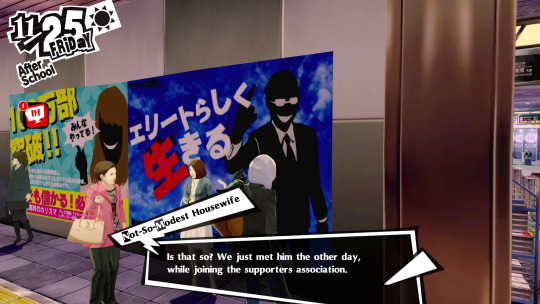
shido has a what now
What's the "supporters association"? In Japanese, it's a 後援会 kouenkai. From Wikipedia:
Koenkai (後援会, lit. "local support groups") are an invaluable tool of Japanese Diet members, especially of the Liberal Democratic Party (LDP). (note: in P5, this is the "Liberal Co-Prosperity Party" or LCP, Shido's original party and the original ruling party.) These groups serve as pipelines through which funds and other support are conveyed to legislators and through which the legislators can distribute favors to constituents in return.
The article is fascinating; do give it a read, as I can't possibly do it justice here. These are massive organisations, and relay vast amounts of cash to their members. They organise endless activities for their members—that meeting at the Wilton Hotel on 5/5 is one. They often require a personal connection to be invited, which is why the Housewife says this to her friend:
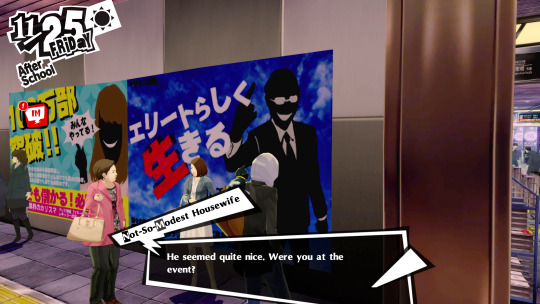
... she knows she wasn't invited.
Though koenkai are weaker in modern times, there are many examples of them being involved with corruption; here are a couple.
"The Asahi reported in the mid-1970s that the [koenkai of former Prime Minister Tanaka Kakuei] "virtually controls… agricultural committees, popular welfare committees, election management committees". This thorough penetration of Tanaka's koenkai into all important facets of Niigata's people's lives propelled him into becoming the father figure of the district. After his arrest in 1976 on corruption charges, many of Niigata's residents still expressed deep respect towards him."
"Due to the huge support [former Prime Minister] Takeshita Noboru enjoyed as a result of his koenkai, his electoral district in Shimane came to be known as ‘Takeshita Kingdom'. Despite being embroiled in many political scandals, related to insider trading and corruption (for which he was never charged), Takeshita's immense local support never waned."
so what does this tell us
In short, Shido's conspiracy is not a few corrupt high-level officials. It's not just Shido, Akechi, the SIU Director and those people on the ship. It is a vast organisation.
It recruits people by reputation (remember those five recommendations in the Palace?) from all levels of society—and those recruits then operate as a bloc, networking, doing favours for each other, advancing their mutual interests, connected via a hierarchy to Shido at the top. This is why Shido can control everything.
It also explains why everyone seems to be linked to the conspiracy—including the hapless Principal Kobayakawa. Did you think it was unrealistic for him to be involved? It seems likely that he was just a low-level member of Shido's koenkai.
When Shido needed someone at Shujin to investigate the Phantom Thieves, Kobayakawa was there—because they have people everywhere. A quick phone call from a higher-up in the organisation—the SIU Director, most likely, who we know Kobayakawa speaks to—and he's eating out of Shido's hand. And will do anything he wants....
So Kobayakawa wasn't anybody at all. He wasn't important. He wasn't somehow part of the deep state. He was just one of likely hundreds of thousands of paid-up Shido supporters looking to advance themselves, getting the vote out, and funding the cause.
He was in the right place at the right time. After all, the koenkai got Kobayakawa his job at Shujin. All his hopes for advancement are centred on it:
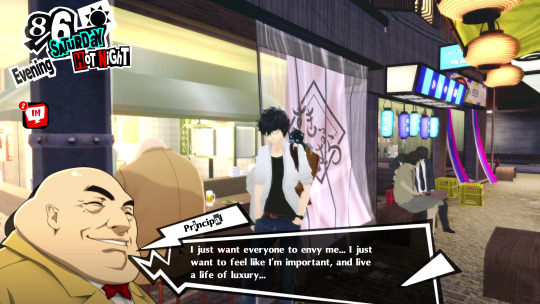
Because just like the two housewives in the underground mall, and probably like everyone else in the koenkai, Kobayakawa is a desperate social climber, impressed by wealth and fame and power and flashy titles.
I hope he thought it was worth it.
revision history
Click here for the latest version.
v1.0 (2023/10/31)—first posted.
217 notes
·
View notes
Text
Why is it the War Devil?
Obviously, I am fascinated by the concept of the War Devil. There is a way in which her presence in the story is uniquely Japanese. Since WWII, the question of how to process the Empire’s defeat has hung over Japanese society. On the conservative side, there is a long project to minimize the realities of the War, especially atrocities committed by the Japanese Imperial Army. Alongside this, there is the concerted effort within the legislature to repeal Article 9 of the constitution, the article which forbids the Japanese government from raising an army. On the left, there is a desire for genuine reconciliation and strong support for article 9. However, the effort has not gained much of a foothold. Japan is, much like the United States, a strongly conservative country.
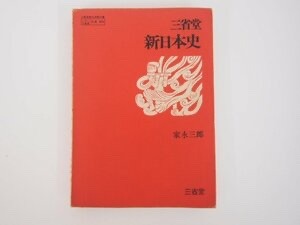
For example, when the historian Ienaga Saburo wrote his textbook “New Japanese History” for public schools in 1953, the government initially approved his manuscript, but when he resubmitted a revised version two years later, they demanded that 216 revisions be made. Revisions included minimizing the Rape of Nanking, adding a mention of public support for the Russo-Japanese war, etc. Straightforward government censorship of established historical fact.
Ienaga sued the government for damages arguing that he was protected by Article 21, the right to free speech. Note: his book was not a state standard. It was simply one of many textbooks available for use by schools. A district court ruled that the government’s demands didn’t constitute censorship, but did constitute an abuse of authority and granted monetary settlement. An appeal to the High court rejected the monetary settlement, and the Supreme Court upheld the appeal.
In other words, the Japanese Government was granted the right to dictate the facts of history “for the public good” in the words of the rulings. Realities of war were erased from the public consciousness with the intent to control the narrative around the Fallen Empire. And the state reasoning was a paternalistic appeal to the greater good of humanity. If this reminds you of Makima’s plan in part one, I am sure that is not a coincidence.
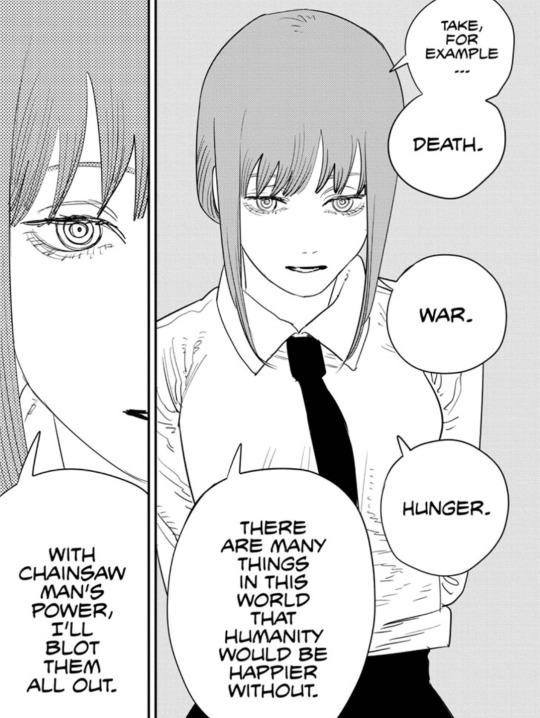
This is a metaphor that I think was broadly missed by the international audience. The idea that War should be forgotten for the sake of humanity, this is the ideology behind historical revisionism. Fujimoto is looking directly at the way that political power in Japan is used to manipulate public understanding of history. Pieces of the past are erased, eaten, and forgotten.
This is why I don’t lend much credence to the idea that Chainsaw Man actually modifies the fabric of the universe somehow when he eats a devil. It is not that the world changes, it is that people forget about it. It’s not that our forgotten sixth sense was deleted. We just forgot it used to exist. It disappeared, perhaps as a part of Chainsaw Man’s attack. And then we forgot.
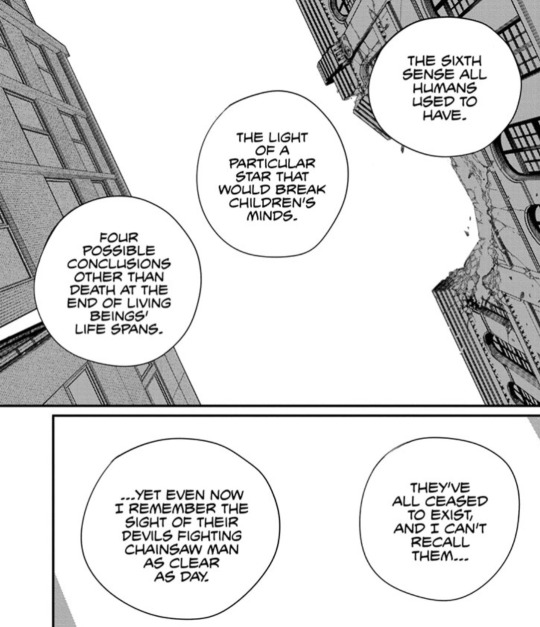
The main reason I think of it this way is because of the parallel with historical revisionism. Right now in Florida the state government is attempting to erase the suffering of African slaves brought to America from the school curriculum. If they maintain this for three generations, no one in the state of Florida will know of this true part of history. It will be forgotten. Humanity in Florida will have forgotten a part of slavery. We don’t need supernatural mechanics to explain historical ignorance. This happens all the time.
Yoru describes this phenomenon in more detail: “War became a thing of books and movies.” Yoru became weakened as humanity became less afraid of war. Parts of the war that really happened are not gone, but have been consigned to unreality. They exist only at a distance. It is only one step further along this axis until they are completely forgotten, until they aren’t thought about at all.
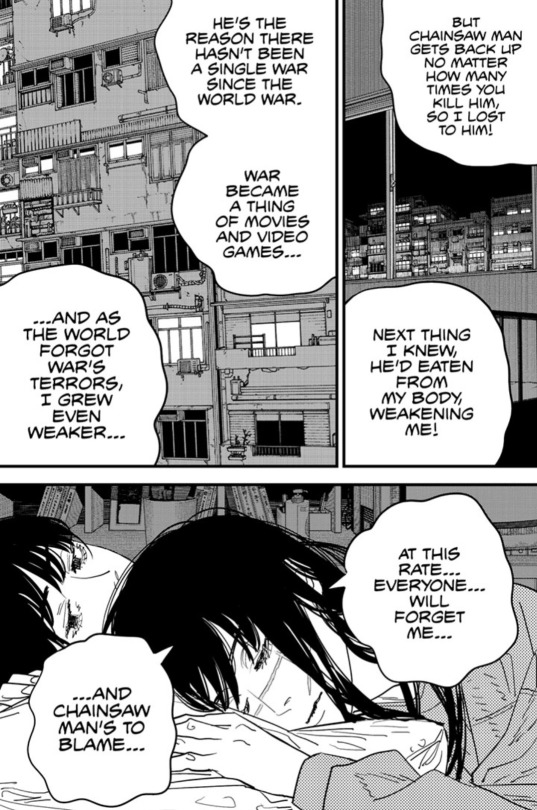
This idea of forgetting War is directly relevant to the political conflicts around Article 9. This conflict is split as I mentioned, but the reality of the situation is more complex. During the occupation, the US Government directed the drafting of the new Japanese constitution. In a real sense, Japan was literally Americanized. The text of Article 9 reads:
Aspiring sincerely to an international peace based on justice and order, the Japanese people forever renounce war as a sovereign right of the nation and the threat or use of force as means of settling international disputes.
In order to accomplish the aim of the preceding paragraph, land, sea, and air forces, as well as other war potential, will never be maintained. The right of belligerency of the state will not be recognized.
This is part of Chapter 2 in the Articles of the Japanese Constitution. Other chapters contain multiple articles. This is the only article in chapter 2 which is titled “Renunciation of War.” To date, Japan is the only country in the world to include a renunciation of war in its constitution.
Of course, Article 9 doesn’t exist out of the kindness of the Japanese people’s peace loving hearts. It exists because the US military thought that the Japanese people were so intrinsically bloodthirsty, that if they didn’t dismantle the empire and remove their ability to raise an army, there could never be peace.
That said, Japanese politicians were involved in the drafting of the constitution as well. Since the war began in China in 1928, a significant faction even among the hawkish types were exasperated with the boneheaded aggression. But the fascists had control of the Emperor, the key figurehead. Once that was lost, cooler heads who were open to the idea of a peaceful Japan stepped in.
So Article 9 starts with this complex identity. On the one hand, it is an imposition by the occupying force, on the other hand, it is a reconciliation within Japan around mistakes the nation made. This remains the case going forward. Because soon after the occupation ends, the Korean War begins.
America, having secured a foothold in the region, realizes that militarily neutering their nearest ally may have been a tactical mistake. But they also still don’t really trust the Japanese government. So they make a move. The US signs a controversial security-treaty with Japan that creates the “National Security Force” to act as a military police. Japanese conservatives then use this precedent to begin building a military under the premise of it being for “self defense.” Thus the JSDF, Japanese Self Defense Force, is born. This was all done with explicit American support.
The American’s didn’t want to team up with the JSDF per se. They wanted Japan to manufacture weapons to create a short supply line towards the Korean front. The creation of the JSDF gives the Japanese government permission to permit manufacturing of military machinery, which was originally taken to be forbidden by Article 9.
Since it’s founding, the JSDF has gradually crept further and further towards active military activity. The final line was crossed in the Iraq war. At the behest of George W. Bush, Prime Minister Koizumi approved a battalion of Japanese soldiers to act in conjunction with the US military for the invasion of Iraq.
This occurs in 2004, in the wake of the 90s. Japan re-enters war in a real way. At this point, article 9 is essentially window dressing on a country which has what amounts to a fully functional military force. But, the existence of article 9 creates a public perception of Japan as being removed from war, even as it actively participates.
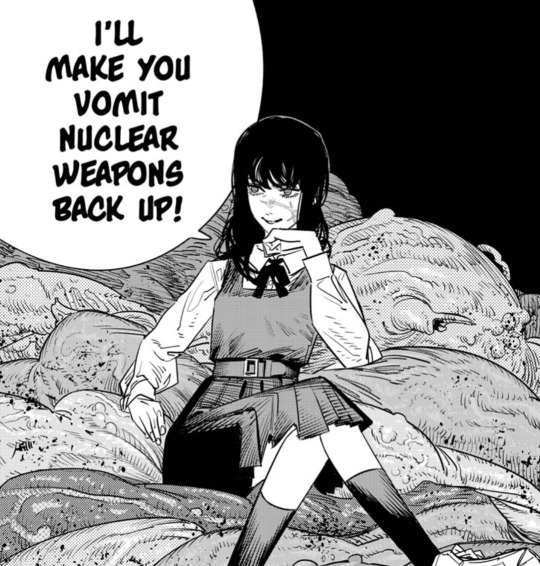
You can see now why when Yoru appeared in chapter 98 I was immediately excited. The idea of the War Devil coming back is a stab at the powers that be trying to paper over their militaristic intentions with political rhetoric. Conservatives are currently moving to repeal article 9. This was one of Shinzo Abe’s major objectives. But he failed to achieve it.
So the struggle continues under the current leadership. And in that context, Fujimoto is placing War front and center. War that has been forgotten but will come back. War that, should she return to full power, will turn legions of young men into weapons.
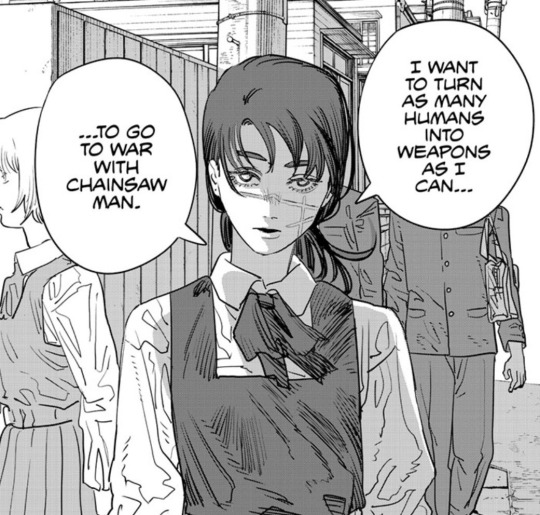
It’s a subtle but also daring message. The debate plays out in politics but is notably absent from public discourse. Japan is different from American in that political conflict doesn’t dominate its media landscape. Generally speaking, the media is running cover for the government.
So to see someone go after this idea of forgotten war, of war coming back from a weakened state, and to highlight the latent threat it poses, is quite refreshing. Once again, Fujimoto manages to subtly weave a cogent political message into the threads of his story, not necessarily by trying to push a particular narrative, but simply by reflecting in his work the political realities he sees in his society.
#chainsaw man analysis#japanese politics#Yoru#war devil#chainsaw man#manga analysis#ienaga saburou#war#Japanese self defense force#jsdf
160 notes
·
View notes
Text

It's a very bad week to be a Prime Minister
1K notes
·
View notes
Text
look I think death note is a really poignant satire of the japanese justice system.
(im not japanese but i am american so. im not saying the japanese justice system is worse than my country's or anything)
japan has one of the lowest homicide rates in the world, and one of the reasons for that is because homicides aren't fucking reported as homicides. they're reported as heart attacks or suicides, because the japanese police just want to say that they have a low murder rate and a high solve rate for murder cases: on a personal level they want good numbers so they can get promoted, but on a societal level they want the police to remain the good guys in the eyes of the public. and that's light. "heart attacks" and "suicides" and "accidents" all actually murders, covered up to uphold the societal ideal of the law as the ultimate good.
in japan, 99% of people charged with crimes are convicted. innocent people falsely accused are put under enormous pressure to confess, at which point they often crack under the pressure and accept conviction. and that's L. he put a lot into the theory that light was the culprit even when he had nothing to go on and indeed evidence to the contrary, because he had no other suspects. and remember when he fucking had misa tortured ????? bound standing up with her eyes covered even when it couldn't have been clearer that they weren't going to get a confession out of her and it had been weeks? and he kept it up pretty much solely because he was too proud to admit that he had been wrong, or at least that this wasn't working.
in that way, light is the corrupt police force, and L is the corrupt judicial system. together they make the system of justice, but do either of them actually believe in that? they say they do, but light's "justice" is deference to the law, or rather, the status quo that the law represents; L's "justice" is having someone in prison, someone to blame, and the same perpetuation of the status quo. ideally they'd be able to keep each other in check - the police to arrest a corrupt judge, the court to convict a corrupt officer - but they're really exactly the same. light killed lind l. tailor, but L is the one who sent him to die.
it isn't 1:1 allegorical but it doesn't have to be. it's a thought-provoking and scathing criticism of what the japanese government calls justice. I think it's solid social commentary
#anyone wanna talk about this? it's interesting stuff and I'm really just repeating/building off of stuff other people have said#death note#media analysis#social commentary#political commentary#social criticism#death note analysis#l lawliet#light yagami#japanese government#japanese politics#police corruption#judicial system#acab
33 notes
·
View notes
Text
Social, Cultural, & Political Things to Help Understand Buddy Daddies - Part 2
Hey there, everyone! Since my first post covering topics like these went over so well, and since I found a few more things I can talk about in these first four episodes that involve a social, cultural, and/or political aspect of Japan, I decided to make a second post.
I type these posts up on my desktop, since that is easier, but after posting, I will go back on mobile and edit in ALT text for the photos. This post is also likely to be very lengthy and image heavy, but I hope you all enjoy the information provided. Also, if anyone has any extra insights, please feel free to share that information. I love learning, and always am learning, so any corrections or further info is always appreciated.
We are going to be starting off with a few simple, quick, and “easy” topics, so to speak. Now, let’s get started!
1. Rock - Paper - Scissors
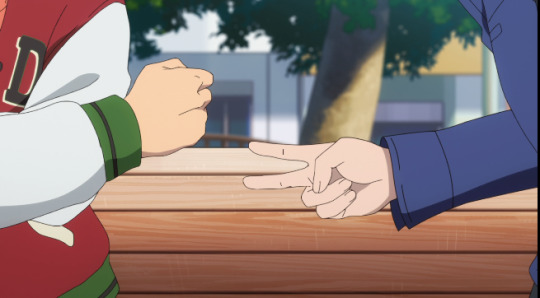
In Ep.3, we see Kazuki and Rei decide who will go and purchase the sweet potato for Miri. In order to decide this, they use Rock-Paper-Scissors. In Japan, the game is called janken and is used in classrooms to decde everything: which row or group in class will go first? Janken. There is a tie, who will win the game? Janken. A student or students are out of class today so there is some extra food left over, who will get it? Janken.
In many cases, this will be use to decide orders as well (like the winner goes first or last and then it goes in ascending or descending order from there). And it won’t just be between two people, they’ll do huge groups. When I worked as an ALT, I would often just trust my students or the JTE (Japanese Teacher of English) or Homeroom Teacher to figure out who won and lost, because I would always lose track... ^ ^;
Anyway, this way of deciding things is viewed as unbiased and a sort of “third-party” decision maker. A nice way to have a decision made without ruffling any feathers. And, we sometimes see using Rock-Paper-Scissors to decide things within the workplace and business world.
Some examples of this are provided on the website Japan Daily, which will be linked below. The website does lean a bit into Orentialism, imo, but it also has some good history and info on Rock-Paper-Scissors in Japan and these real life examples of it being used in a business/work environment are great:
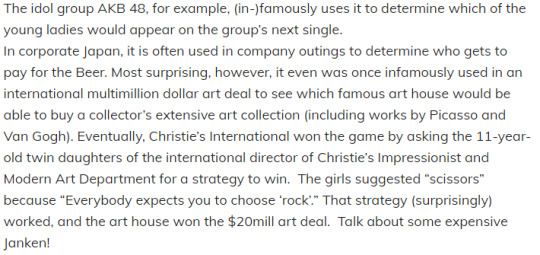
2. Baked Sweet Potato - Street Food
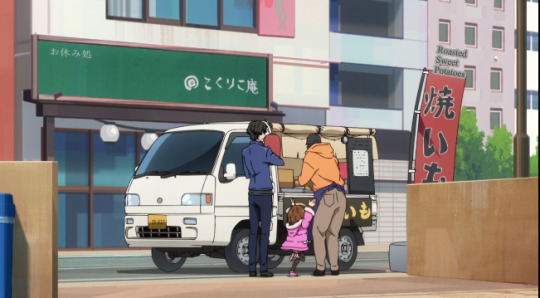
Baked sweet potato is a very common street food in Japan in the fall and winter months. They are cheap, smell delicious, are delicious, and are a great way to warm up cold hands. Nowadays, many are sold out of small, white vans like the one shown in Buddy Daddies.

(Image from Asahi Imports).
They are usually eaten plain and the inside tends to be a light, off-set white. Like ice cream trucks, the sweet potato vendors will usually set up shop around playgrounds, school areas, parks, etc. basically any place where a large crowd is likely, and they will usually shout out that they have sweet potatoes. In a similar way to the vendors walking around selling food, drinks, and peanuts at a baseball game or something.
You can read more about this winter time snack over at Asahi Imports, which will be linked below (they also make mention of daigaku imo, which is a dish you’ll see in Japanese school lunches in the fall and winter months, and which is very yummy!).
3. Obake - Ghosts

I was watching a reaction video to episode 3 of Buddy Daddies, and the reactor was like, “Isn’t she afraid of ghosts?” And, well, that made me think of a very popular song and book in Japan called おばけなんてないさ (Obake Nante Nai sa). It is a very famous children’s song and (later) picture book in Japan. The song was first broadcast on an NHK program called “Minna no Uta” in 1966. This info is from the website Hello Project Lyrics Wiki, and will be linked in the comments below.
When I worked at a Japanese cram school back here in the States, we had a bunch of copies of the books, and all the teachers had the book and song memorized. All the parents were familiar with it too, and it was taught in the youngest class, since the book and song is for the 0 - 2 year old age range.
Here is a Youtube video with the book and the song being sung to it. Warning: This song WILL get stuck in your head. The beat is very simple and easy to remember, so you’ll definitely end up humming it, even if you don’t know the lyrics.
undefined
youtube
I’ll link to English lyrics that I found for this song in the comments. But the general gist is that there is no such things as ghosts, they aren’t real, but if they were, I (a child) would be afraid of them. So the song goes on to tell of how you can befriend a ghost instead, and not be afraid of them anymore.
Miri is 4 years old, and can write her name, speak and understand well, and has good coordination skills. So there has been some level of education, so she has likely heard this song before. And therefore probably isn’t afraid of ghosts on a more conceptual level, though she still equates them with “bad guys,” lol. If she hasn’t learned it or heard it yet, she probably will now that she is in daycare.
There are four more issues/aspects that I plan on discussing, so I’ll put those under a Read More due to length and them being slightly less lighthearted.
4. Animal Rights
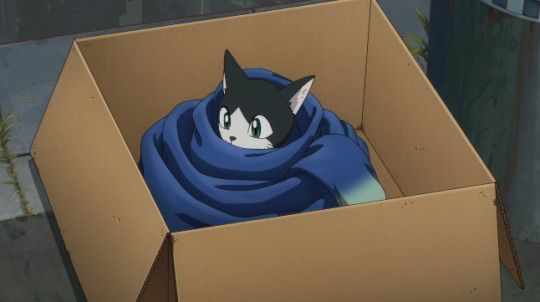
When I watched reaction videos to the first episode, many people were upset at the cat being returned to the box (and the cat even just being in a box to begin with). I was too, of course, but I also knew where this scene was coming from. For this section, I will be citing the article: Challenging, inadequate animal welfare in Japan, which I will link to below. Though, I also came across the article Why You Shouldn’t Buy a Pet in Japan, which I will also be linking below, since I think it is worth the read.

Basically, Japan has laws in place, and they get revised every 5 or so years, however, they are very vague and the general public knowledge of animal rights is farther behind than in other industrialized nations. In the other article that I will be linking below, they mention that about 90% of pets in Japan are bought through pet stores, rather than through adoptions or rescues. So, as the other article states, abandonment of pets is rather high, especially because of how trend-based pet ownership is in Japan.
Things like pet cafes can really influence pet trends. I’ve been to two myself, an Owl Cafe in Osaka and a Hedgehog Cafe in Tokyo.

That was a number of years ago now. And while those experiences were AMAZING! I do think about the ethics of it all and think, if I were to return to Japan some day for a visit, those kinds of cafes wouldn’t be on my To Do list.
However, there are groups and organizations to help fight for animal rights in Japan. Since this section of the post was inspired by the scene with the cat in the box, I’ll highlight the cat based one mentioned in the article:

So that’s good to hear!
5. Parenting Style

Another thing I noticed during reaction videos were the responses to scenes like the above, where Miri is kicking at the back of Rei’s car seat and whining, “I wanna go swing!” As well as to scenes like below, where Miri caused all of Kazuki’s food supplies and materials to spill all over the ground.

All of them have made mentioned that moments like those require strict discipline. But, Japanese parenting style differs a bit when it comes to things like this. In an article entitled: Japanese Parenting Style - And Differences From the West, which will be linked to below, we get this bit on discipline:

Basically, it is saying that Japan isn’t really big on punishment because Japanese children learn to behave by learning the importance of cooperation and harmony through other social groups like school and sports. This is definitely true. What I’ve seen is that the expectation is that the children still don’t fully understand the ins-and-outs of society yet.
I worked at a Japanese daycare, so our job was to take a gentle parenting approach, to help explain to the child why what they did was hurtful or harmful or dangerous. And one of our goals was to help the children learn how to play amicably with each other.
That’s not to say that I haven’t seen children be yelled at or anything like that. I have. But it is usually the teachers that take on that mantel, especially at the junior high school level. That’s when you get stuff like students have to practice bowing during an assembly over and over and over again until they get it just right, especially if that assembly is a rehearsal for an important event, like graduation ceremonies.
Bringing this back to Miri though. Now that she is in daycare, she will start to receive this gentle parenting approach to learning how to co-exist with others, which will eventually result in more positive behaviors (or, that is the ultimate goal, anyway). Miss Anna will likely provide a lot of that guidance as the head daycare teacher.
6. Snack Bars

Miri’s mother works at a Snack Bar and, over on the official website, it states that her job is as both the Mama and singer at the Snack Bar and that she is 34 years old. But what is a Snack Bar and what is a Mama?

Snack Bars were started in 1964 to work around government laws that prevented adult entertainment establishments from staying open after midnight, by offering light snacks, that changed the category that they fell under, thus they could stay open. The Mama of the Snack Bar is basically the one in charge of the Snack Bar.
They are similar in ways to Hostess Bars, but on the cheaper side. You can read about more of the details about how they run and what not at the website Metropolis Japan, which I will link to in the comments.
Another thing about Snack Bars is that, while they don’t sell sex, they sell the fantasy and illusion of sex:

They are also a outdated nowadays (with their peak being back in the 80s), so there is a general seedy vibe about them. It may seem like an okay place to take kids from the name alone, but they are very much so adult-only spaces. Also, as we saw with Miri’s mother, likely a place and setting where the exploitation of women happens.
7. Casinos and Gambling in Japan
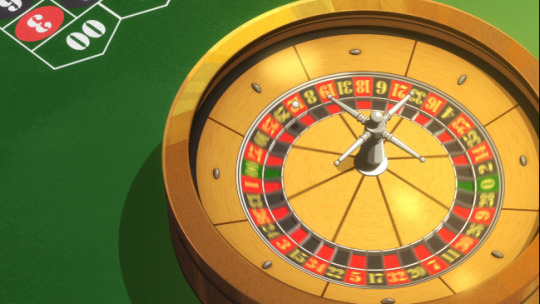
We saw Kazuki do some gambling in Ep. 1. Something you may have noticed, however, was who lured him in:

And what the outside of the establishment looked like:
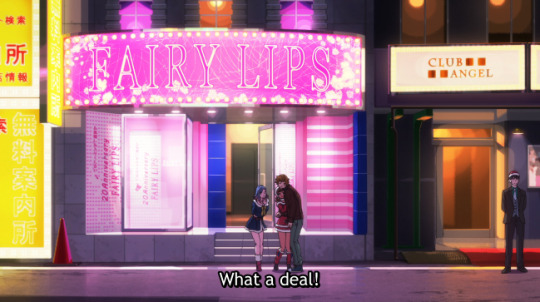
Two young and sexy women and a bright, sparkling pink building named “FAIRY LIPS.” You probably guessed that this isn’t a legal gambling establishment. Casinos and gambling are still largely illegal in Japan, with some exceptions like lottery. The ones that are illegal are likely being run by Yakuza.
However, some changes have gone into affect in more recent years, especially as a way to attract tourists.

Over on the Wikipedia page about Gambling in Japan (which will be linked below in the comments), it talks about how Japanese lawmakers approved a bill in July 2018 that officially allows casinos in the country. However, they come with a lot of restrictions, such as Japanese locals only being able to visit them three times per week or ten times a month, and Japanese visitors will be charged 6,000 yen entrance fees to discourage addiction.
And...that’s it for this post! Thank you all for reading this far and for all the love and support you’ve all shown to my previous post (and other meta posts I’ve made). I really and truly appreciate it! I’ll be keeping an eye out for topics like these in future episodes. Though, those posts should be a lot shorter, since I’ll be going on an episode-by-episode basis, instead of in bulk like this.
Until next time!
#Buddy Daddies#Kazuki Kurusu#Rei Suwa#Miri Unasaka#Misaki Unasaka#Japanese culture and society#Japanese politics#long post#meta post#image heavy post#Youtube
195 notes
·
View notes
Text
Some hopeful news out of Japan
13 notes
·
View notes
Text

#architecture#japan#street#building#street photography#urban photography#urban#city#tokyo#urban landscape#house#red#blue#politics#japanese politics#japanese#materials#colors#textures#streetshot#city streets#cityscape#buildings#streetscape#street scene#patchwork#東京#日本#home
9 notes
·
View notes
Text
I checked and yes the philipine president got Covid, today. In addition to everything else.
I think we may be viewing an act of God
#the philippines#Shizno Abe#boris johnson#clownfall#Japanese politics#japan#UK politics#marcos JR#*looks at Putin*#Come on come on one more one more#You can do it Angel of death come on
387 notes
·
View notes
Text
Akiko Ooishi is a member of the House of Representatives. She is a politician in Reiwa Shinsengumi and is both a co-representative and policy council chairperson in this political party. Here, she shows solidarity with Palestine and calls out the mass genocide being committed by Israel.
I also just learned Reiwa Shinsengumi is a progressive, left-wing party founded in 2019. They are anti-establishment, anti-nuclear, and support minority rights. They also want to raise the minimum wage, implement laws protecting free education, disability rights, LGBTQ rights, to name a few. I just did a little research, and by no means is this encompassing but I hope to learn more.
Also, when she told someone to be quiet, I love her for that ✊🏻❤️
#feminist#feminism#israel is an apartheid state#palestine#social justice#freepalastine🇵🇸#free gaza#free palestine#israel is committing genocide#intersectionality#japan#israel is a terrorist state#israeli apartheid#israeli war crimes#reiwashinsengumi#japanese politics#current events
1K notes
·
View notes
Text
so @dagny-hashtaggart made a really interesting post about how Japanese Pop Culture Stories About War are often about Japan's position vis a vis the world during the Cold War more than about WWII.
They're heavily informed by WWII, don't get me wrong. But let's be honest- it's easier to get your audience to identify with a plucky underdog than the agent of a fascist regime. Post-WWII Japan is much easier to spin into an underdog than WWII Imperial Japan.
And that got me thinking about the Fire Emblem Tellius games- y'know, the ones with Ike- because holy shit, looking at it with that interpretation in mind opens up a whole new avenue for analysis.
Spoilers for the whole subseries under the cut.
Fire Emblem games are not, as a rule, subtle. They might be nuanced. They might be willing to look at the humanity of awful people, acknowledge that everyone is the protagonist of their own story, and so on. But they're not subtle, and you can generally get the point that the writers are trying to make on a casual first playthrough.
....so the Tellius games are about the small nation of Crimea being attacked by an evil empire called Daein. The heroes have to beg for help from the surrounding nations- primarily a large theocratic empire called Beignon. They also have to convince the nations of laguz- shapeshifting furries that most Crimeans are horribly racist against- that if Daein comes for Crimea they'll come for the laguz next. A wrinkle in all of this is that Beignon has traditionally kept laguz as slaves (though the current empress is trying to change that) and so getting all of these nations to coordinate a defense is difficult, to say the least.
Our plucky heroes manage to get help and save the day, but the story doesn't end there.
It turns out that Beignon, as an occupying force, is tyrannical and cruel. Beignon occupies Daein after the war, and a group of freedom fighters rise up to kick out the occupiers and take back their home. These freedom fighters wind up taking over the government of Daein, and - thanks to some Plot we won't go into - are forced to go to war with Beignon, despite that being a terrible idea.
The people behind this war are the senators who rule Beignon. Some of them are trying to enrich themselves and bring back slavery, while others are, essentially, trying to bring about the end of the world on their Goddess' behalf. (Long story.)
It takes a literal deus ex machina to get this war to stop, and Our Heroes- both the group from the original game and the freedom fighters from Daein- band together to take on the goddess that Beignon worships and save the world from being eternally frozen in time. (Again, long story.)
The stated theme of the game is "the human urge to fight isn't a bad one- it's the urge to protect what you love and stand up for what's right, and without it, you might as well be a statue. But war is stupid, pointless, and started by people with power to forward their own agendas. If ordinary people use that urge to fight for what's right to get past their racism and other differences, the world is a much better place than if they put it into fighting wars that don't matter."
And like, the connection I didn't make until seeing that post... reading this game with the Cold War in mind makes some very interesting (and honestly, sardonic) political points about the real world!
I know I sound a bit Vriska (Vriska) here, but consider that storyline in this light:
Crimea is postwar Japan, complete with a tiny military that's spread too thin and Horrible Retrograde Politicians who want to bring the country back to its Glory Days.
Beignon is the First World, and more specifically, the United States. A large, seemingly-benevolent country with a slavery-filled past, a borderline theocratic democratic oligarchy, and a willingness to help smaller nations? Yeah. Also, the Beignon senators have some of the more Stereotypical Westerner features that you see in the game.
Daein is the Second World. Calling the Plucky Tiny Player Country Crimea is probably meant to call the USSR to mind. They're a bit Generically Evil and honestly this is the weakest part of the analysis.
The various Laguz nations are the Third World. They're politically divided, often isolationist, and have historically been the victims of racism from the other nations on the map. They've also often got... unfortunate tribal aesthetics and many are noticeably darker-skinned than the main cast. (Is this problematic? Oh yeah. But in the analysis? I think it's worth bringing up.)
The political subtext of the game thus becomes "Japan needs to shake off its racism and its dependence on the American military. We need to make allegiances with other small, struggling nations, while trying to avoid going to war because see above."
You can see why I'm going feral over this, because it is a much more blatantly political statement than I recognized as a kid- while simultaneously being a nuanced, interesting take that you don't often see out of Japanese media. (At least, not the stuff that gets localized for the benefit of the USA.)
#fire emblem#tellius#fe: tellius#fire emblem path of radiance#fire emblem radiant dawn#politics#japanese politics
56 notes
·
View notes
Text
Someday there's gonna be a gender-bender manga where a character, like, turns to the proverbial camera and says something like "Did you know that even with a pill that magically transforms your body (or whatever), Japanese law requires that you be surgically altered so that you don't have functioning gonads before you're allowed to change your gender in the family register? I thought that was interesting" and just that alone will make it 9006% more transgender than whatever "but I'm a guy"-internal-monologue-every-five-minutes nonsense is popular this week.
#shenanigans#serious business#(yes both of those tags)#japan#japanese politics#trans stuff#transgender#human rights#human rights violation#transphobia mention#institutional transphobia#onimai#(obliquely)#gender bender#let's ruin anime#tails gets trolled
11 notes
·
View notes
Text
I've deleted tiktok off my phone and now mainly use Instagram reels. I get a bunch of content related to Japan (makes sense I'm moving there) but omfg the comments are like the trenches. Some are purely racist to Japanese citizens and others are such Japan dick riders that it's insane.
Anyway recently got a post about a white guy complaining that TOKYO has gotten too "foreign" and that he doesn't want Japan to "lose" their culture. I've got a lot of thoughts on this but nowhere to put them so here they are:
I'm literally losing my mind at how many people think Japan is this orientalist non-westernized country when Japan has westernized itself since the 1890s. Losing my mind at foreigners in Japan complaining that there are more foreigners in Japan and acting like they've been in Japan since before it when they moved there in like 2010.
Saw someone comparing Japan to Hawai'i in how it's losing its culture (truly mindboggling considering what Japan has done to Okinawa) and another guy who's name was literally Noah saying "Americans should keep their bs out of japan no one wants your stupid westernization" like dude ur name is Noah.
Also, no part of America has "westernized" Japan since the early 20th century, and Japan's "westernization" is entirely Japan's own doing for wanting to be in proximity to whiteness. No other culture country or people gets to decide where Japan's culture gets to go, that is solely up to the Japanese people (mind you not the government but the PEOPLE)
Most people obsessed with Japanese culture have never read an actual book on Japan that goes beyond "Japan has shrines that worship the kami or spirits of the world" and "being polite is important as a tourist in Japan". If they did, then they'd know that during the pre-war era and throughout the wartime era, the Japanese government purposefully put out cultural propaganda in order to boost nationalism. They wanted Japan to seem entirely unique and therefore more special than all other Asian countries. This is not to say Japan does not have beautiful cultural traditions that extend centuries, but largely those have been transformed and marketed to Japanese and foreign tourists alike.
Shrines and shrine groups donate and mass support alt-right-wing groups in Japan. The over-politeness culture is part of the awful workplace conditions and suicide rates. Actual Japanese people have spoken to these facts but that does not mean they do not like their home culture. Globalization/modernization will not westernize Japan. Women's rights, LGBT rights, labor rights, and immigrants' rights, will not westernize Japan. They will save Japan.
These Japan-obsessed right-wingers will ignore the hundreds of years of protests and civil rights groups to create an orientalist idea of Japan. None and I mean NONE of those people care about Japan, Japanese culture, or Japanese people, they only care about living out their orientalist fantasies while actual Japanese people living their daily lives are simply background props.
We need to stop pretending Japanese people are not their own people with history, culture, and movements.
Here are just SOME links on Japanese politics not known by most people (please message me if you're interested in these topics or would like more resources):
Nippon Kaigi- Alt Right Religious Group
Japanese Work Culture
Ainu - Indigenous Group of the Lands in the Okhotsk Sea
Ryukuans (Okinawans) - Indigenous Group of the Ryukyu Islands
Scream from the Shadows- A Book on the 60s Feminist Movement in Japan
Chizuko Ueno "Forty Years of Japanese Feminism" - Prominent Japanese Feminist
Burakumin - Lowest "Caste" Group in Japan
Zainichi Koreans - Resident Koreans Who's Families Entered Japan During and After the War
LGBT Rights - LBGT+ Rights Group in Japan
Organizing the Spontaneous - 60s ANPO Movement
Sadly I cannot find the twitter page that often posts modern-day Japanese news that normally is not posted by other news organizations. But if any of you remember it please send me the page so I can add it as I believe it is an important resource. Or just reblog with it!
Look, whether you like or dislike Japan, remember it's a country with people just like anywhere else. Do not dismiss the work activists have done in Japan. Do not say Japan "needs this political movement", instead talk about how Japanese progressive groups need international support and recognition (mind you don't say this about any country, especially largely nonwhite countries!!! you are completely ignoring and rejecting the work millions have put into social change!!! instead talk about those people!!! talk about those movements!!! don't let their efforts be forgotten!!! don't let any government tell you these movements are new!!! THEY AREN'T!!!!). One of the biggest ways we can create change and push away alt-right groups and people from any place is by ruining their image of those places.
Do NOT let the alt-right in Japan convince you Japan is purely homogenous and that Japan is the best country in the world. Do not let the Japanese government erase the Ainu, the Ryukyuan, Immigrants, Zainichi Koreans, LGBTQ+ citizens, women's rights, the Burakumin, the poor, and the communists/progressives of Japan. Do not let ANY country erase that history!
DO NOT LET JAPAN PLAY THE VICTIM TO "WESTERIZATION"
#Japan#Japanese politics#weeb culture#white supremacy#progressive politics#this post got way out of hand and there's still so much to add that i feel bad for leaving things out#anti blackness is something id also like to talk about but i also know there's countless black people sharing their own stories#please feel free to message me if you're interested in further research and information#especially on things like anpo the ainu ryukyuans and burakumin#if anyone is interested i have a massive paper on burakumin political action and history post war i wrote#please dm for more resources!!
20 notes
·
View notes
Text
Just a humungous congratulations to any and all Japanese trans people or trans people living in Japan who may see this on your dash today 💙 ily I'm so happy for you, drink water and make sure to apply dysphoria aleviating techniques with care and compassion for your body!!
12 notes
·
View notes
Text
Japanese PM to unveil measures to protect Amazon rainforest during Brazil visit
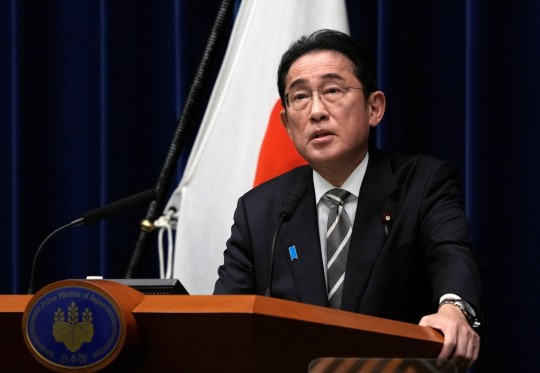
Japanese Prime Minister Fumio Kishida is set to announce his intention to strengthen support for protection of the Amazon rainforest during his visit to Brazil in early May, government sources said.
The measures are centered on financial contributions and assistance for regenerating degraded farmland to prevent deforestation and promote the development of sustainable agricultural landscapes, the sources said.
Kishida, who is scheduled to visit Brazil next week, is expected to sign a comprehensive cooperative agreement on climate change, decarbonization and other environmental issues when he meets with President Luiz Inacio Lula da Silva, the sources added.
His visit to the Latin American nation would come as Japan has been seeking to deepen relations with developing and emerging countries, collectively dubbed the "Global South," among which Brazil is viewed as one of the key players, along with India and Indonesia.
Continue reading.
#brazil#japan#politics#japanese politics#environmentalism#amazon rainforest#international politics#mod nise da silveira#image description in alt
4 notes
·
View notes
Text
https://open.spotify.com/show/6jFHw2iTeWCtJ1ECRA5zee?si=NUkVe-O8QQ-MablEA6sAVQ
I’ve been listening to this really interesting podcast about fascism in Japan as viewed through a Marxist lens while I was doing a lot of driving today and it put my mom to sleep but she was following where she could and then when were 3/4 the way home she turns and asks me “what’s fascism?” (Her native language isn’t English.)
I love her. But if she didn’t understand that then she probably didn’t get a ton out of it.
Rly good podcast to get an intro to Japanese fascism and the host brings in rly intelligent speakers and debunks myths about Japan and gives me some good resources to go read
#of course I was more than happy to explain it to her#fascism#Japan#Japanese politics#communism#Spotify
79 notes
·
View notes